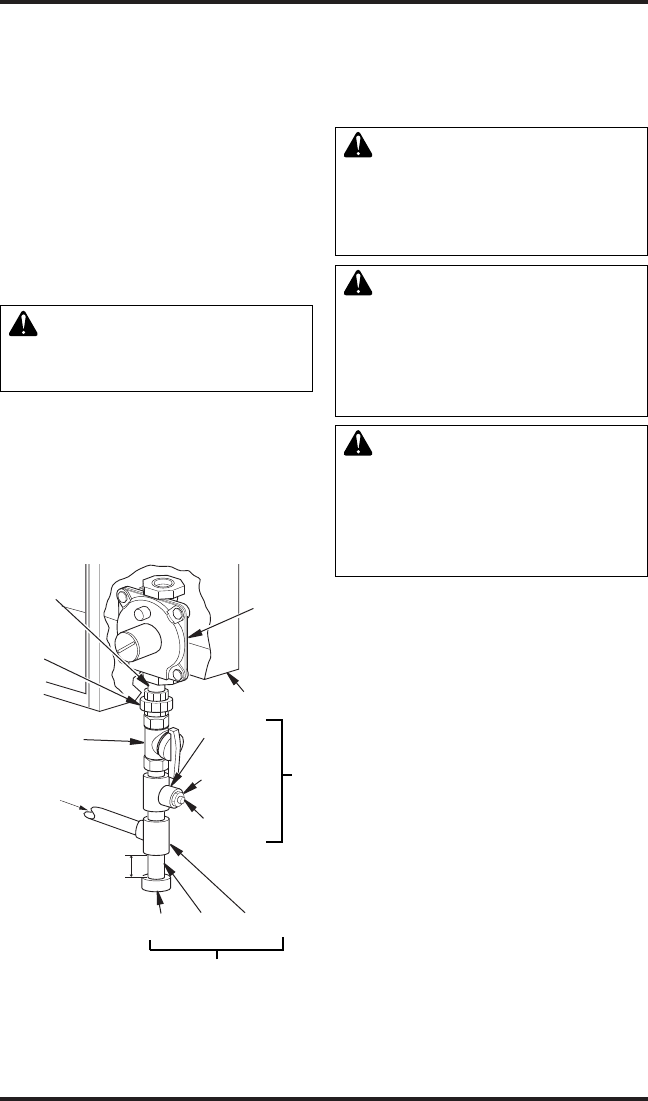
www.desatech.com
11107902-01K
Cap Pipe Tee
Nipple Joint
Tee Joint
Reducer
Bushing to
1/8" NPT
1/8" NPT
Plug Tap
* A CSA design-certied equipment shutoff valve
with 1/8" NPT tap is an acceptable alternative to
test gauge connection. Purchase the optional CSA
design-certied equipment shutoff valve from your
dealer. See Accessories, page 22.
Figure 13 - Gas Connection
Pressure
Regulator
Test Gauge Connection*
Heater
Cabinet
Sediment Trap
Equipment
Shutoff
Valve *
3"
Min.
Ground
Joint
Union
3/8" NPT
Pipe Nipple
Natural Gas
From Gas
Meter (7" W.C.
to 10.5" W.C.
Pressure)
Propane/LP
From External
Regulator
(11" W.C. to 14"
W.C. Pressure)
INSTALLATION
Continued
IMPORTANT: Hold the pressure regulator with
wrench when connecting it to gas piping and/or
ttings. Do not over tighten pipe connection to
regulator. The regulator body could be damaged.
CHECKING GAS CONNECTIONS
WARNING: Test all gas piping
and connections, internal and
external to unit, for leaks after
installing or servicing. Correct
all leaks at once.
WARNING: Never use an
open ame to check for a leak.
Apply a noncorrosive leak detec-
tion uid to all joints. Bubbles
forming show a leak. Correct all
leaks at once.
CAUTION: For propane/LP
gas, make sure external regula-
tor has been installed between
propane/LP supply and heater.
See guidelines under Connect-
ing to Gas Supply, page 10.
PRESSURE TESTING GAS SUPPLY
PIPING SYSTEM
Test Pressures In Excess Of 1/2 PSIG
(3.5 kPa)
1. Disconnect appliance with its appliance main
gas valve (control valve) and equipment
shutoff valve from gas supply piping system.
Pressures in excess of 1/2 psig will damage
heater regulator.
2. Cap off open end of gas pipe where equipment
shutoff valve was connected.
3. Pressurize supply piping system by either
opening propane/LP supply tank valve for
propane/LP gas or opening main gas valve
located on or near gas meter for natural gas
or using compressed air.
4. Check all joints of gas supply piping system.
Apply a noncorrosive leak detection uid to
all joints. Bubbles forming show a leak.
5. Correct all leaks at once.
6. Reconnect heater and equipment shutoff valve
to gas supply. Check reconnected ttings for
leaks.
Installation must include equipment shutoff valve,
union and plugged 1/8" NPT tap. Locate NPT tap
within reach for test gauge hook up. NPT tap must
be upstream from heater (see Figure 13).
IMPORTANT: Install an equipment shutoff valve
in an accessible location. The equipment shutoff
valve is for turning on or shutting off the gas to
the appliance.
Apply pipe joint sealant lightly to male NPT
threads. This will prevent excess sealant from
going into pipe. Excess sealant in pipe could result
in clogged heater valves.
WARNING: Use pipe joint
sealant that is resistant to liquid
petroleum (LP) gas.
Install sediment trap in supply line as shown in
Figure 13. Locate sediment trap where it is within
reach for cleaning. Locate sediment trap where
trapped matter is not likely to freeze. A sediment
trap traps moisture and contaminants. This keeps
them from going into heater controls. If sediment
trap is not installed or is installed wrong, heater
may not run properly.


















